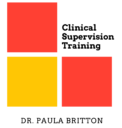Description of program: This workshop is designed to train supervisors on the administrative and management tasks necessary in many supervisory roles, including program development and quality assurance. It is intended to help mental health providers reach their maximum effectiveness clinically, but also administratively as most supervisory roles include some need for management training, which is rarely taught in master-level academic curricula. Clinical administrative and management skills are different from clinical skills yet are critical for successful supervision, whether preparing for that role or continuing to hone it. Management skills relate to important clinical administrative duties such as handling conflict, performance evaluations, preventing burn-out, and developing programs as well as evaluating their quality. The workshop curriculum address organizational processes and procedures for supervisee recordkeeping, reporting and monitoring of supervisee’s cases; program goals, methods of needs assessment, and program development; Ohio laws and professional standards, research and evaluation; agency or institutional policies and procedures; roles and responsibilities of supervisors and supervisees; multiple roles of supervisors; strategies to help supervisees advance to optimum performance; productivity, job satisfaction, and preventing burnout.
Workshop objectives: Upon completion of the workshop, participants will:
- Understand organizational processes and procedures for managing supervisees and programs.
- Implement program assessment, goals, and development toward quality assurance and improvement.
- Learn the specific skills needed to provide administrative versus clinical supervision.
- Be informed of Ohio Laws and professional standards.
- Manage multiple roles of supervision
- Know helpful policies and procedures for individuals and programs.
- Gain strategies to help supervisee advance to optimum performance, productivity, and job satisfaction.
- Apply the Myers Briggs typology inventory to increasing competency in supervisory role.
- Prevent burnout in self and supervisees, including preventative programmatic initiatives.
Outline of workshop:
8:30 – 9:30 Administrative Supervision
This hour of the workshop includes defining the difference between clinical and administrative supervision and how the two roles overlap. It includes a section on leadership skills. It involves both small group work and PowerPoint presentation.
9:30 – 10:35 Roles/functions of supervision
- Policies, procedures, productivity
- Research
- Individual and program evaluation
This section reviews managing productivity, documentation of supervision, performing evaluations both formative and summative, developing supervision contracts, and dealing with misbehaving supervisees, which is all captured in PowerPoint content.
10:35 – 10:45 Break
10:45 – 12:00 Organizational processes and procedures
- Using the Myers Briggs Type Indicator (MBTI) test to improve supervisory competencies
- Managing caseloads
- Program development, assessment, goals, and quality assurance and improvement
- Utilizing the MBTI in supervision
This PowerPoint section describes how to help supervisees more effectively manage their caseloads, assess a program, and work toward improvement. There is a section on how to improve supervisory competencies by understanding one’s MBTI typology, which participants are asked to complete prior to the workshop. Discussion includes how one’s MBTI topology might influence one’s supervisory style and interface with different supervisees, with the ultimate goal of improving supervisee clinical skills.
12:00 – 12:45 Lunch
12:45 – 1:30 7 Habits of highly effective managers: Advancing to optimum performance, job productivity, and satisfaction
This section uses Stephan Covey’s material to help supervisors assist their supervisees in better job performance and increased effectiveness as a clinician. It includes very practical ways to handle conflict and get the most out of those you supervise, and is delivered via PowerPoint.
1:30 – 2:00 Video and discussion
The video is a role play of an ineffective supervisory session. The discussion is about applying Covey’s principles to the session to make it more effective.
2:00 – 2:10 Break
2:10 – 2:45 Preventing and managing burnout for the individual and agency
This section is on how to help your supervisees prevent and manage burn out, and is presented via PowerPoint. The literature is clear that the supervisory relationship is a critical variable in helping clinicians prevent the very common phenomenon of burn out in mental health providers. Part of this material is based on Robert Wicks’ work on developing resilience.
2:45 – 3:35 Case discussions
In this section the participants work in small groups. Each group is given a case that represents a supervision dilemma and a series of questions. They then present the case and their analysis of it to the larger group, which provides opportunities for integration of the day’s ideas.







Reviews
There are no reviews yet.